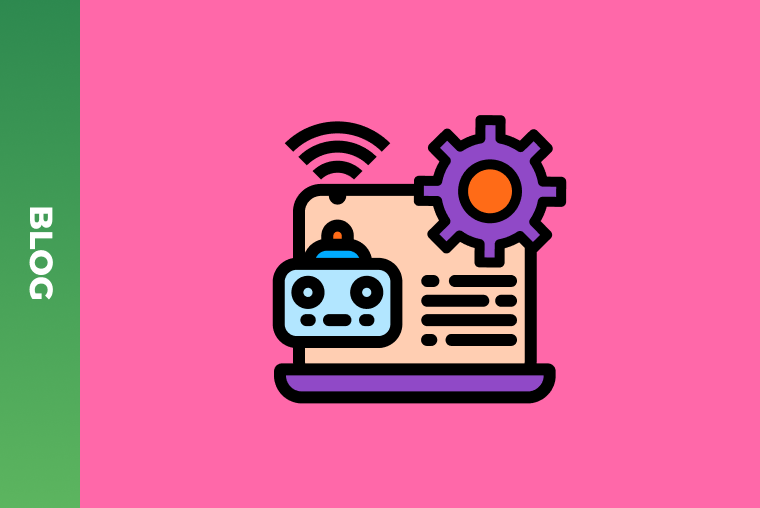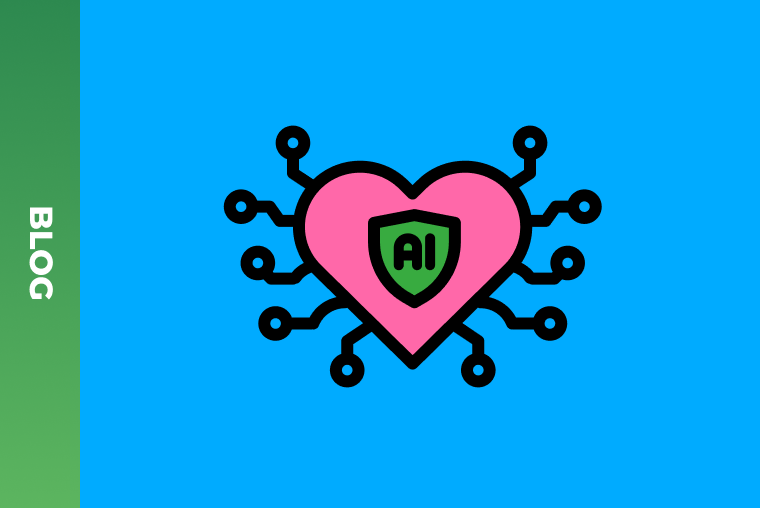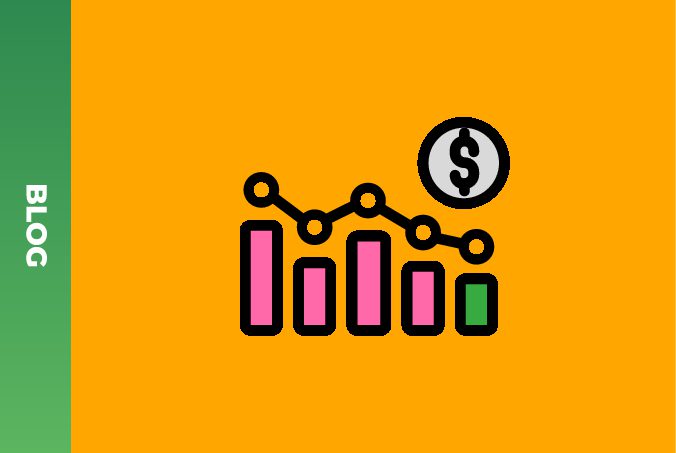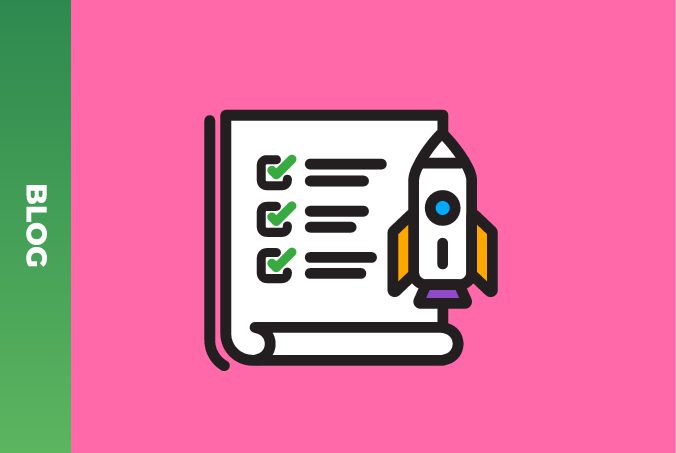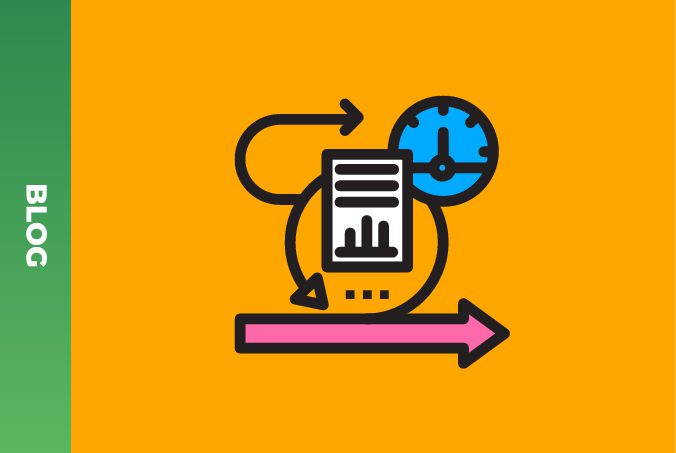What impact will AI and IoT have on healthcare data security?
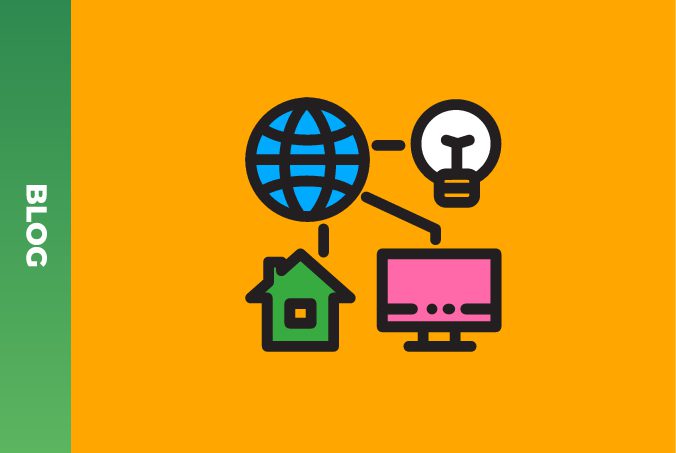
The integration of Artificial Intelligence (AI) and the Internet of Things (IoT) in healthcare has brought about transformative changes, revolutionizing the industry by enhancing patient care, health records, telemedicine, hospital management, health tracking, and drug discovery. However, with these technological advancements come significant considerations and challenges, particularly in the realm of data security.
Some interesting figures: According to the research by ResearchGate, the Internet of Things with Artificial Intelligence System (IoT-AIS) was proposed for health care security, where the following results were achieved: data transmission rate (98.14%), delivery rate (98.90%), high period of standard responses (93.79%), less delay estimation (10.76%), improved throughput (98.23%), effective bandwidth monitoring (83.14%), energy usage (8.56%), and performance rate (98.4%).
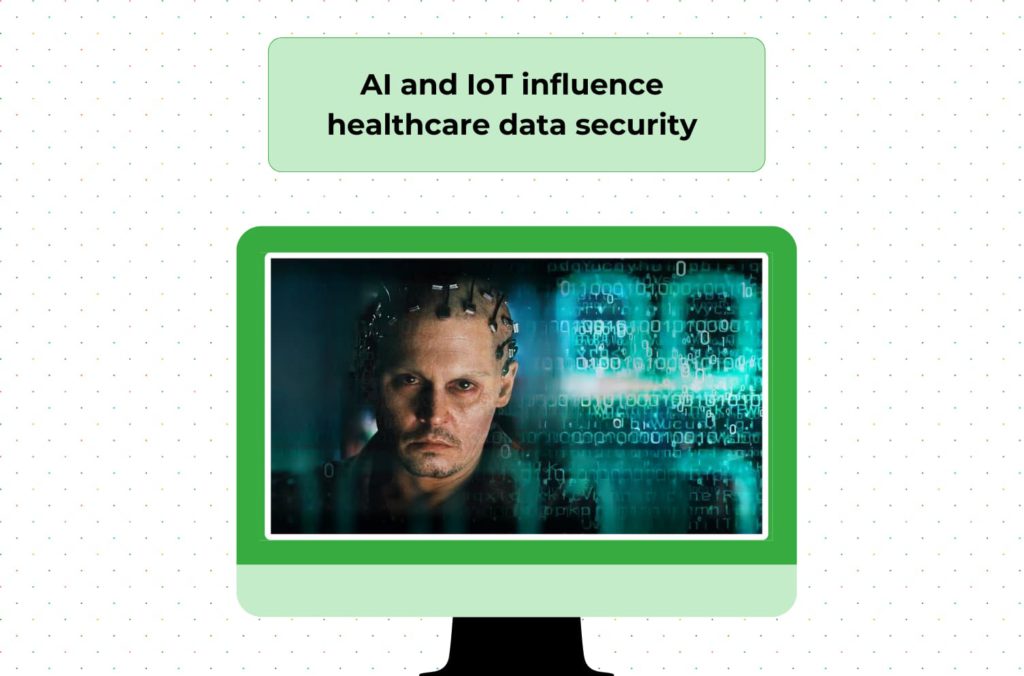
As the use of these technologies expands, it is worth determining their perspectives, weak points, and capabilities to strengthen data security in healthcare. This article is about how AI and IoT influence healthcare data security.
What is the future of AI in healthcare?
There are three things you can watch forever: fire burning, water falling, and AI transforming various industries, in particular, healthcare. AI, with its ability to analyze vast datasets and derive meaningful insights, is reshaping diagnostics, treatment plans, and personalized medicine. Let’s consider some prominent examples of AI applications in healthcare:
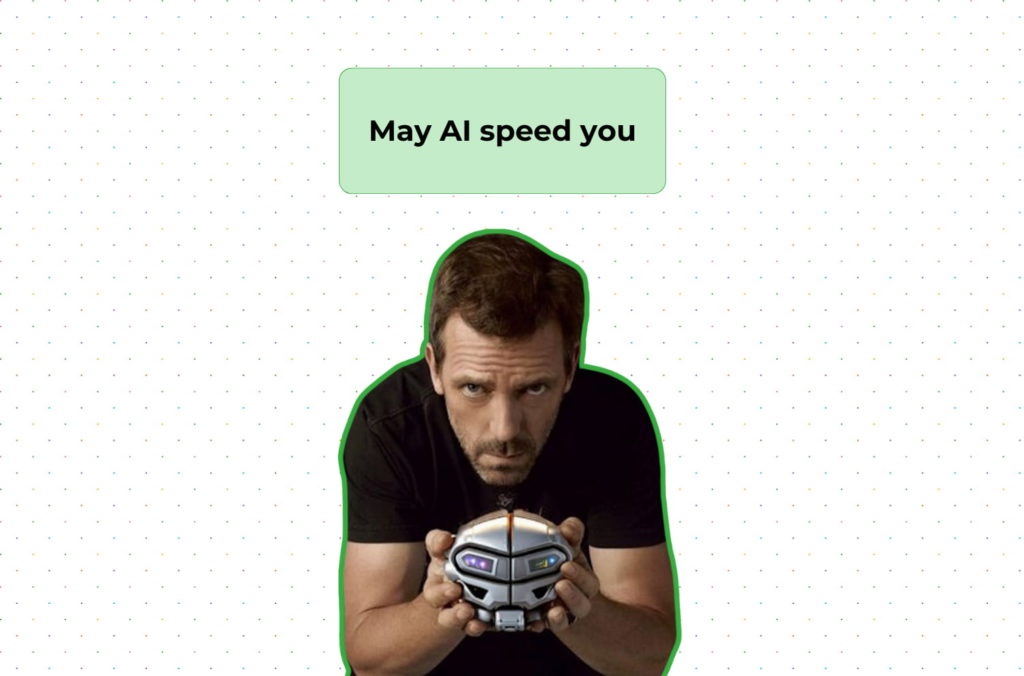
- Early disease detection: AI algorithms are used now to analyze medical images, and diverse datasets and identify patterns, biomarkers, or anomalies indicative of the early stages of diseases, reducing the time between identification and intervention
- Accelerated drug discovery: AI analyzes biological data to identify potential drug targets and validates their relevance to specific diseases, accelerating the drug discovery process by providing researchers with insights into promising avenues for therapeutic intervention.
- Improved treatment planning: AI-powered systems analyze patient data, clinical guidelines, and medical literature to assist healthcare professionals in developing optimal treatment plans, ensuring evidence-based decision-making, and contributing to improved patient outcomes.
As we can see, the contribution of AI to the healthcare industry is quite impressive. And its application keeps growing. That’s why AI technologies are promising in healthcare. Learn more about how AI can empower your business with our AI transformation service and our previous research concerning AI and BI.
How can AI improve medical device security?
AI plays a crucial role in enhancing medical device security by offering sophisticated capabilities in threat detection, anomaly identification, and real-time monitoring. Integrating AI into medical device security strategies can significantly enhance the resilience of healthcare systems against evolving cyber threats, safeguarding patient data and ensuring the integrity of medical device operations. Let’s look through how it works:
- Behavioral analysis: analyzing the normal behavior of medical devices, including patterns of data transmission, device interactions, and user access.
- Data encryption management: overseeing the encryption and decryption processes for data transmitted and stored by medical devices.
- Network traffic analysis and anomaly detection: scanning network traffic associated with medical devices to detect suspicious activities or unusual data flows.
- Vulnerability management: assisting in identifying and prioritizing vulnerabilities in medical devices.
- Swift incident response: providing immediate responses to potential security incidents with AI automated capabilities, which helps isolate compromised devices, and limit the impact of security breaches.
What is IoT?
IoT stands for the Internet of Things, which means a network of interconnected physical devices, appliances, and other objects embedded with sensors, software, and network connectivity. IoT is fostering a connected healthcare ecosystem, where smart devices and wearables seamlessly collect and transmit real-time patient data, enhancing monitoring and preventive care. Since IoT is engraved in healthcare, it is important to align it with data security.
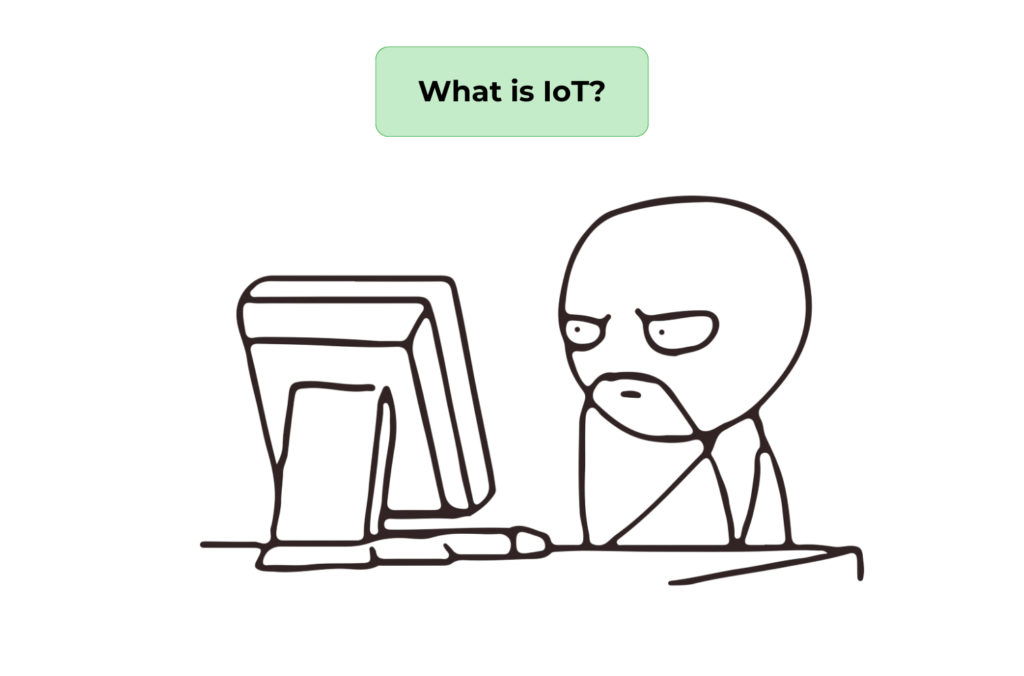
What about healthcare IoT security?
As IoT devices become integral to medical practices, ensuring their security is paramount to safeguard patient information, maintain the reliability of medical data, and prevent unauthorized access or malicious activities. This involves implementing measures to protect the integrity, confidentiality, and availability of data transmitted and processed by IoT devices in healthcare settings. These steps may, inter alia, include authentication and access controls, network segmentation, privacy, and data governance. Earlier, we showed results of how a healthcare data platform could level up data security.
What are healthcare IoT vulnerabilities?
However, in addition to the aforementioned, healthcare IoT security is characterized also by vulnerabilities. Let’s take a look at some of them:
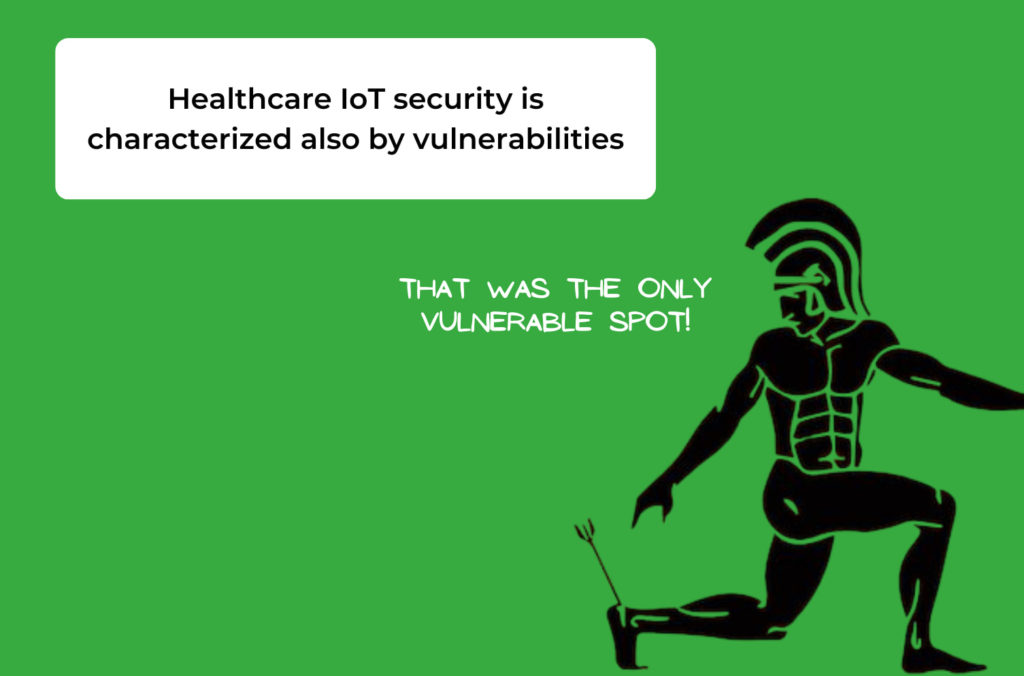
- Privacy concerns: IoT devices often collect and transmit sensitive patient data. Privacy concerns arise when these devices are not designed with robust privacy protection measures, potentially leading to unauthorized disclosure of patient information.
- Denial-of-service attacks: IoT devices, if not adequately protected, may be susceptible to denial-of-service (DoS) attacks. Attackers can overwhelm devices or networks, disrupting their normal operation and potentially impacting patient care.
- Integration challenges: Integrating IoT devices with existing healthcare systems and networks can introduce complexities that, if not addressed properly, may turn out to be challenging. Incompatibility issues or misconfigurations during integration can lead to security gaps.
- Unauthorized access: Lack of comprehensive logging and monitoring capabilities, encryption, inadequate authentication and authorization limited security awareness, weak network security, and interconnected nature might result in accessing to IoT devices or data.
How can AI and IoT be used for enhanced healthcare data security?
As the volume of health-related data constantly grows and new technologies appear, safeguarding patient information and keeping healthcare data secure become essential. Applying AI and IoT in healthcare is definitely a breakthrough, but let’s see whether they are helpful when it comes to preventing data breaches.
How to prevent data breaches in healthcare with AI:
- Healthcare compliance regulations: AI might be utilized in automating and optimizing compliance processes. Machine learning algorithms can process vast datasets to identify potential compliance risks, ensuring that healthcare providers adhere to stringent regulations such as HIPAA.
- Healthcare cybersecurity analytics: By continuously analyzing patterns in network traffic and user behavior, AI tools can identify anomalous activities indicative of potential cyber threats. For instance, NLP can be employed to detect phishing or social engineering attempts in communication channels. Plus, AI-powered endpoint protection solutions use machine learning models to identify and block malware and ransomware attacks in real-time.
- Security monitoring: Automated monitoring systems equipped with AI algorithms can detect unusual patterns or behaviors, triggering immediate alerts.
How to prevent data breaches in healthcare with IoT:
- Improved access control: IoT devices can be equipped with robust authentication mechanisms, including role-based access control, ensuring that only authorized personnel have access to sensitive healthcare data.
- Integrity checks: IoT devices can perform automated integrity checks on their software and firmware. If any unauthorized traces are detected, the device can alert administrators or take predefined actions to maintain data integrity.
- Real-time monitoring and response: Implementing specialized IoT security platforms enables continuous monitoring of device activities. Real-time alerts can be generated in response to suspicious actions, helping healthcare organizations respond promptly to potential security incidents.
Conclusion: Importance of data security in healthcare
At the end of this article, we want to say that prioritizing data security in healthcare is not just a regulatory requirement; it is a fundamental commitment to the well-being, privacy, and trust of the individuals whose health information is entrusted to the care of the healthcare system. Even though IoT may cause vulnerabilities and gaps in data security, the latter can be handled with thoughtful implementation of AI- and IoT-driven cybersecurity measures, regular assessments, and the adoption of best data security practices. To be more aware of how AI and IoT could be beneficial to your business, you are welcome to get a free consultation from us.

